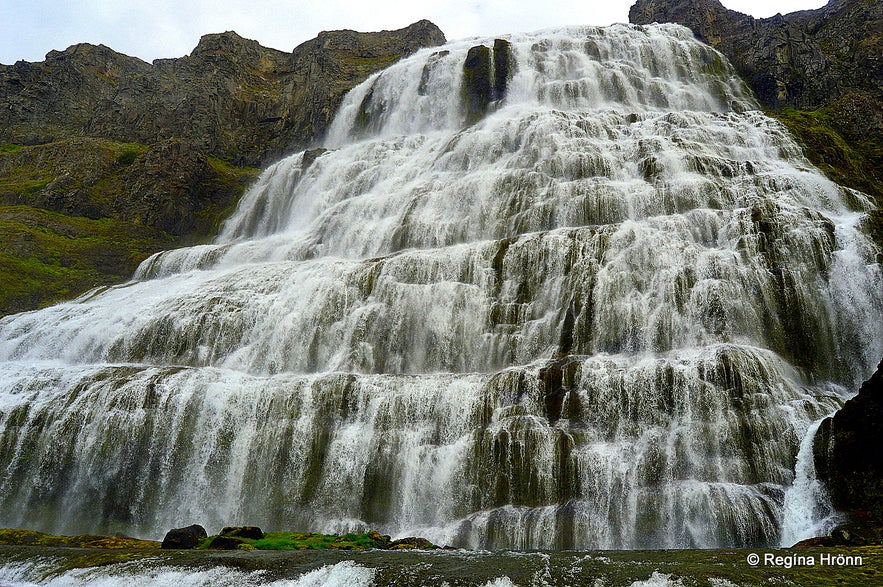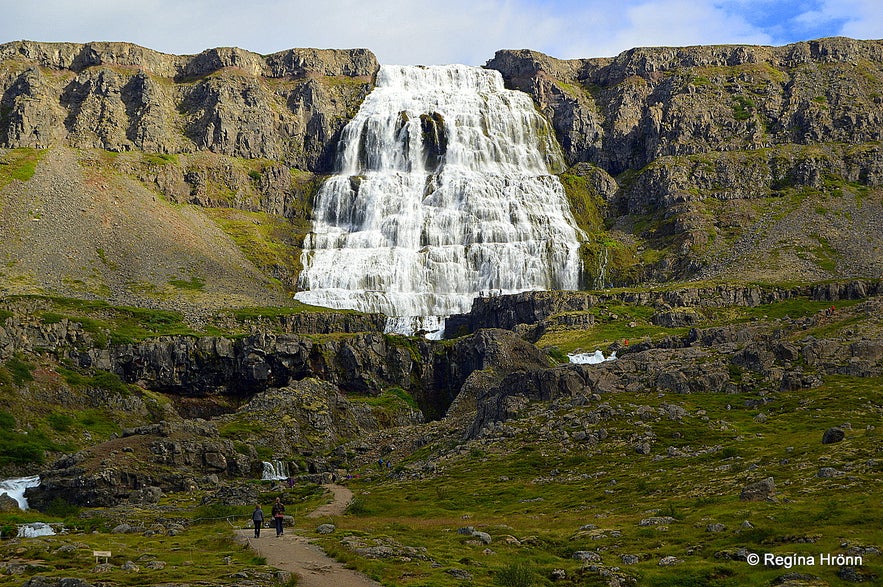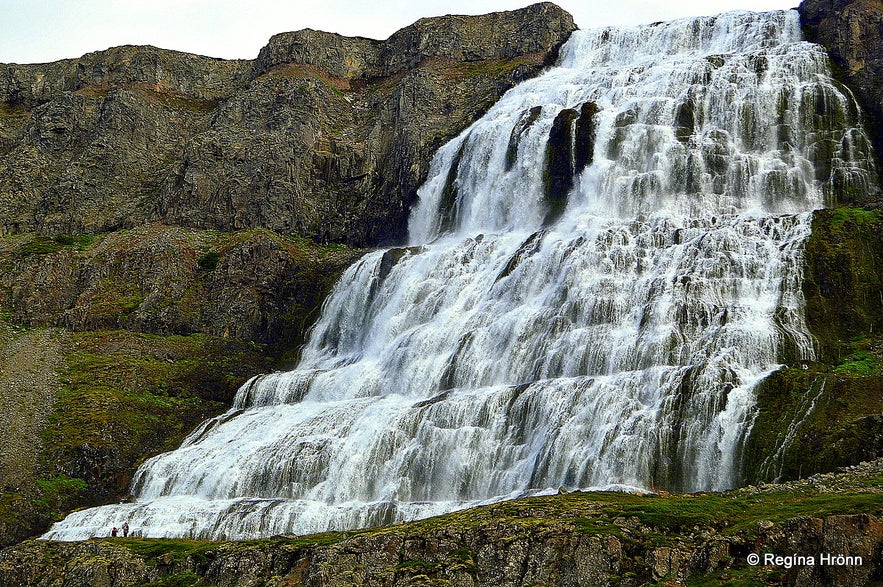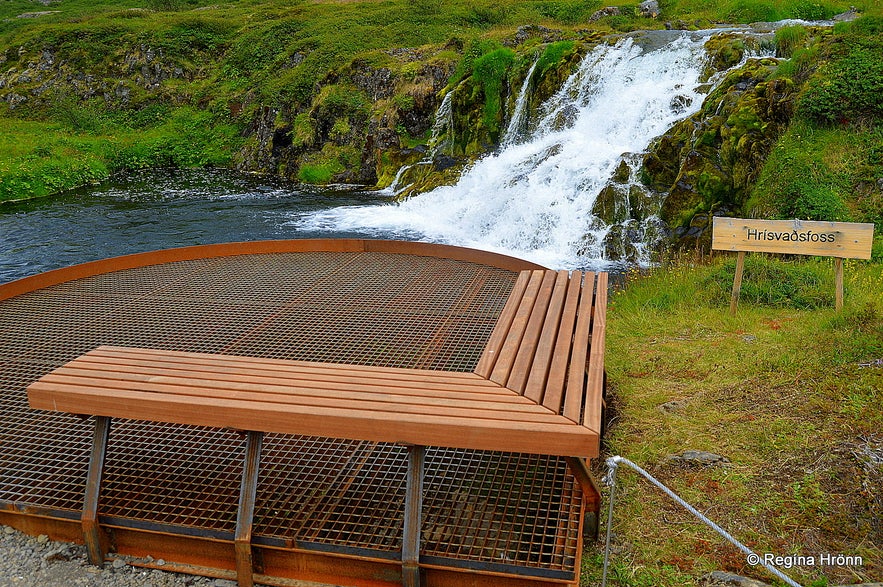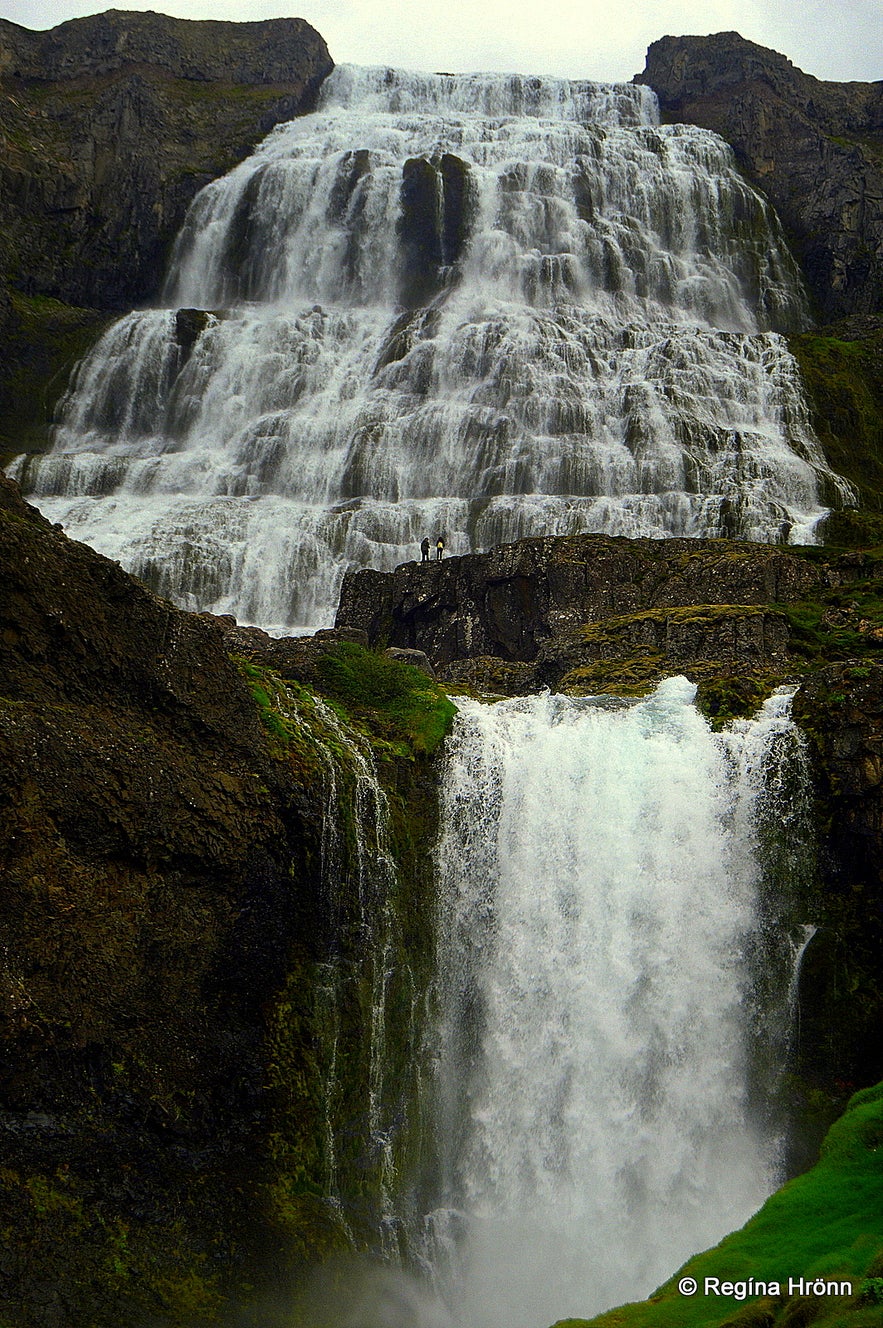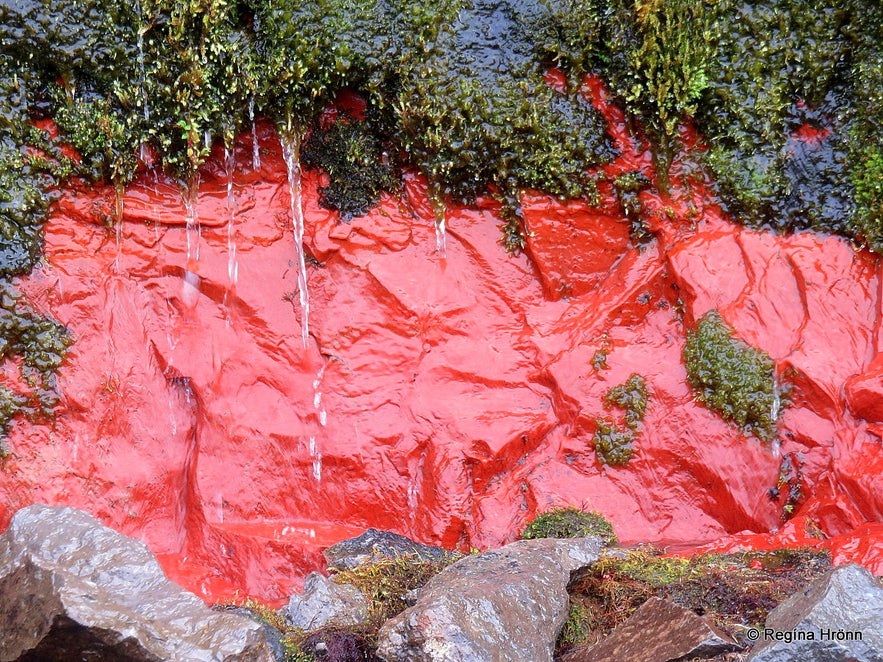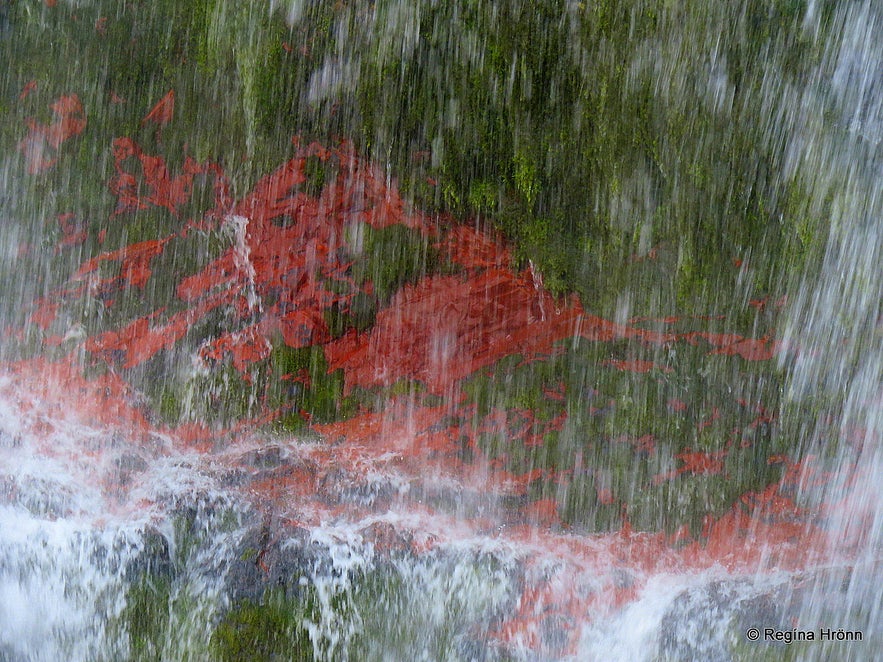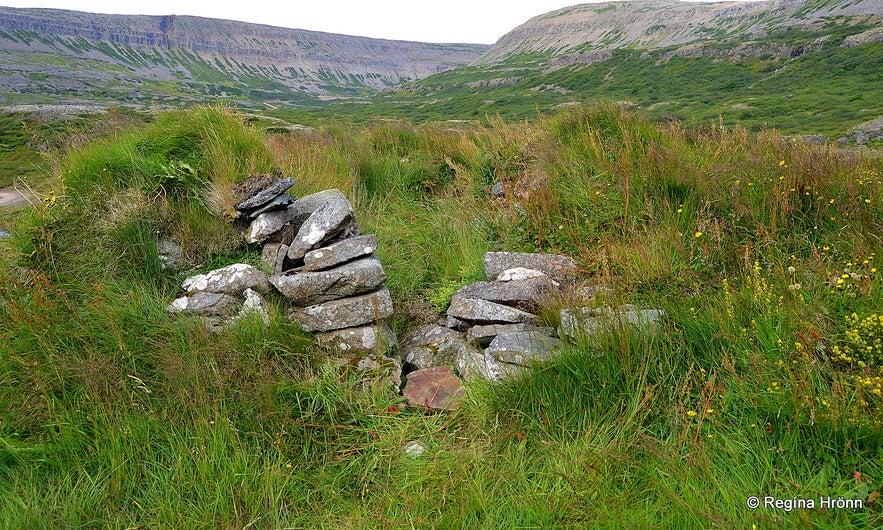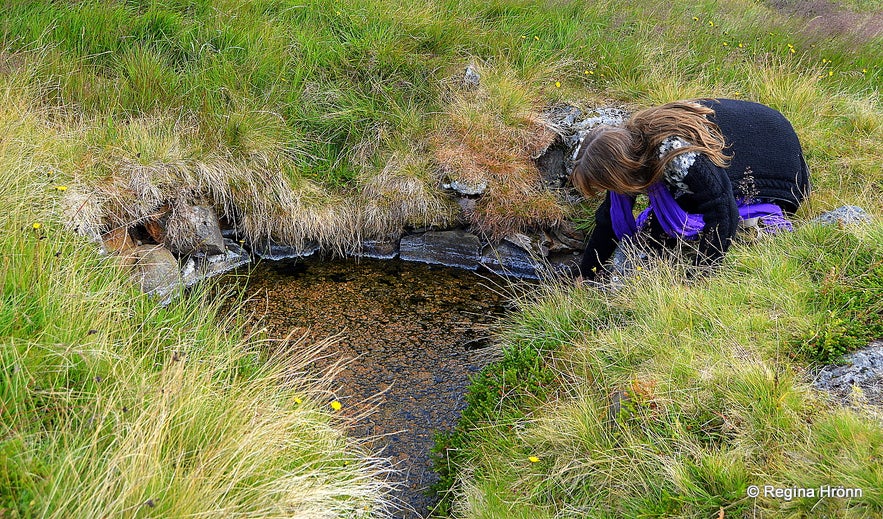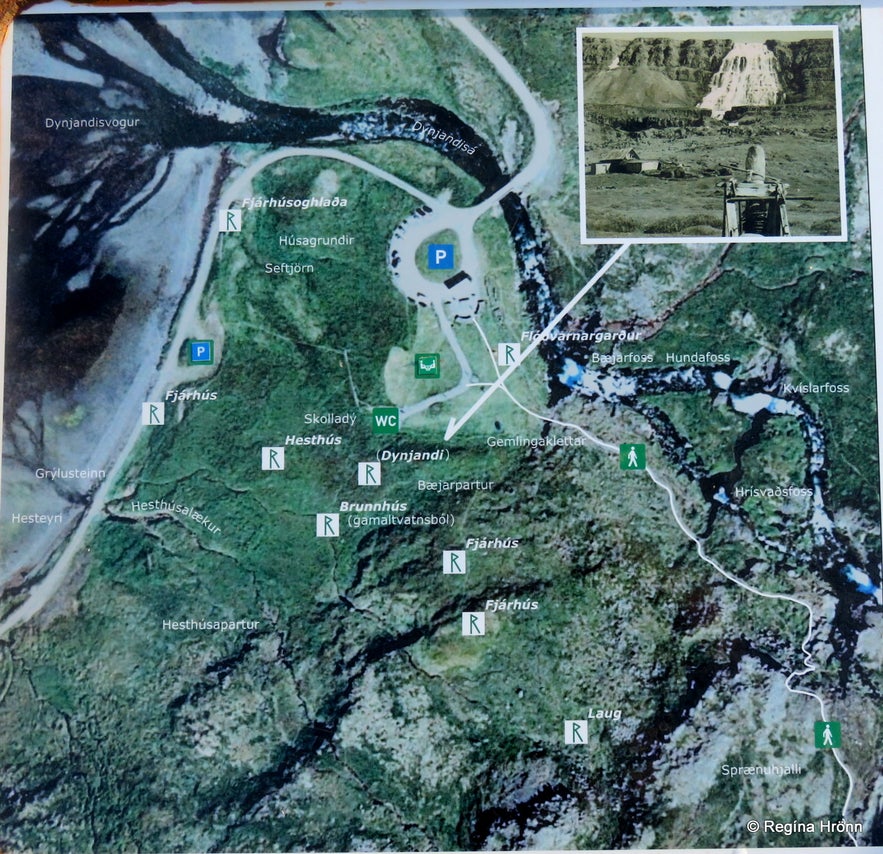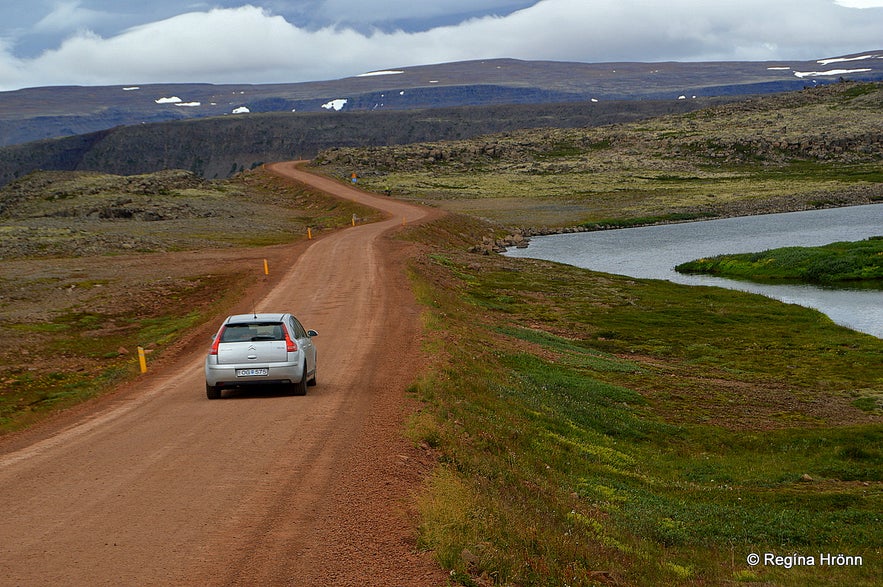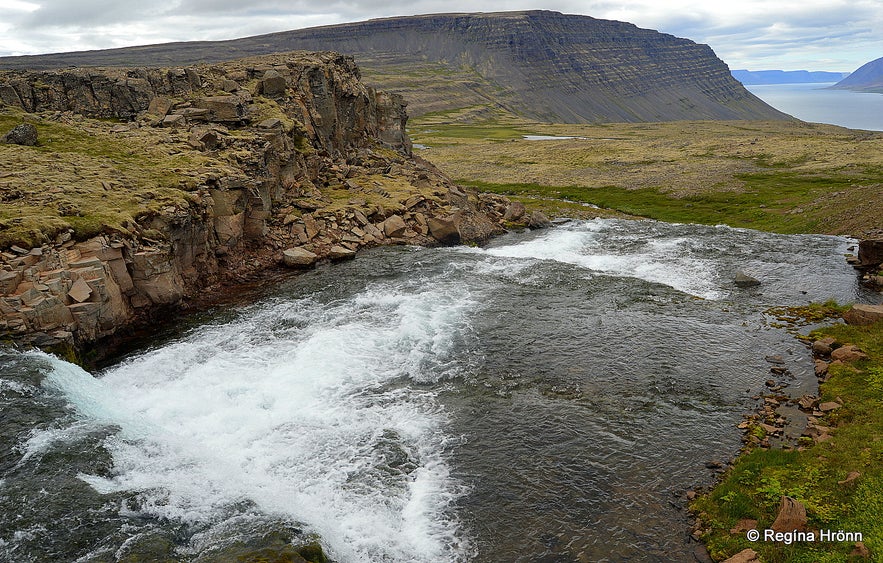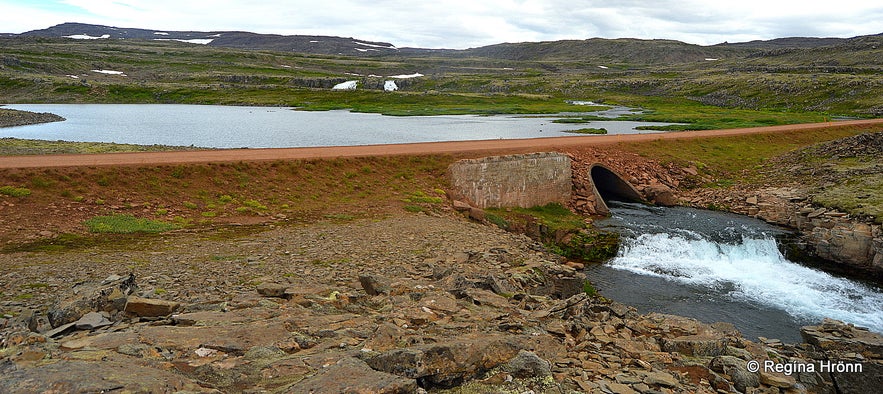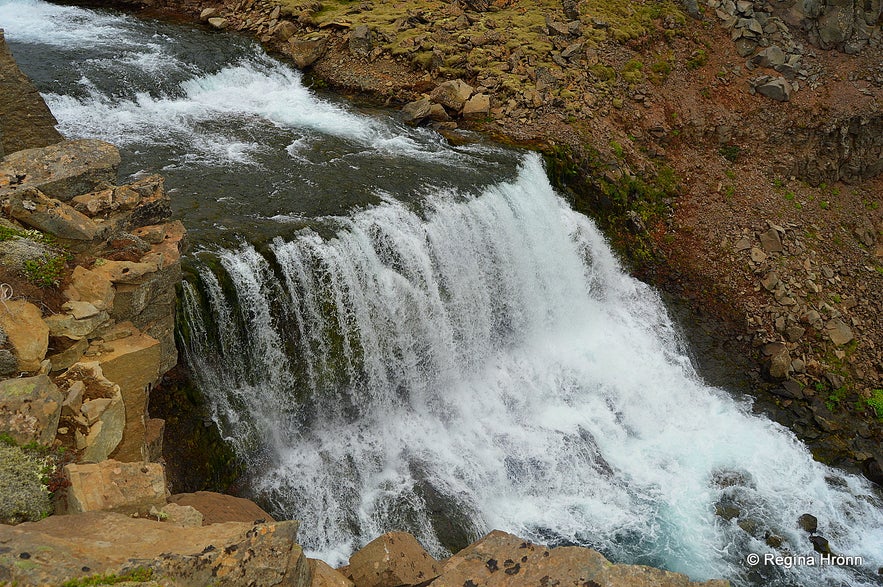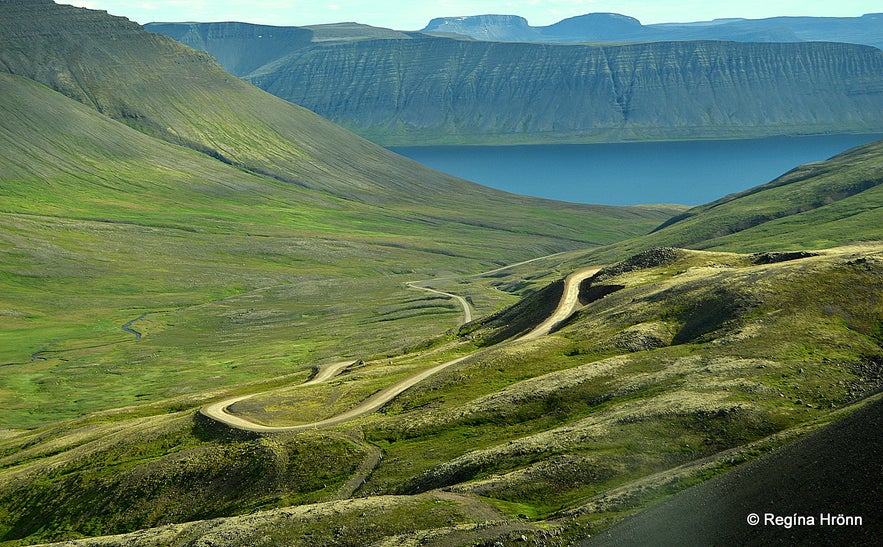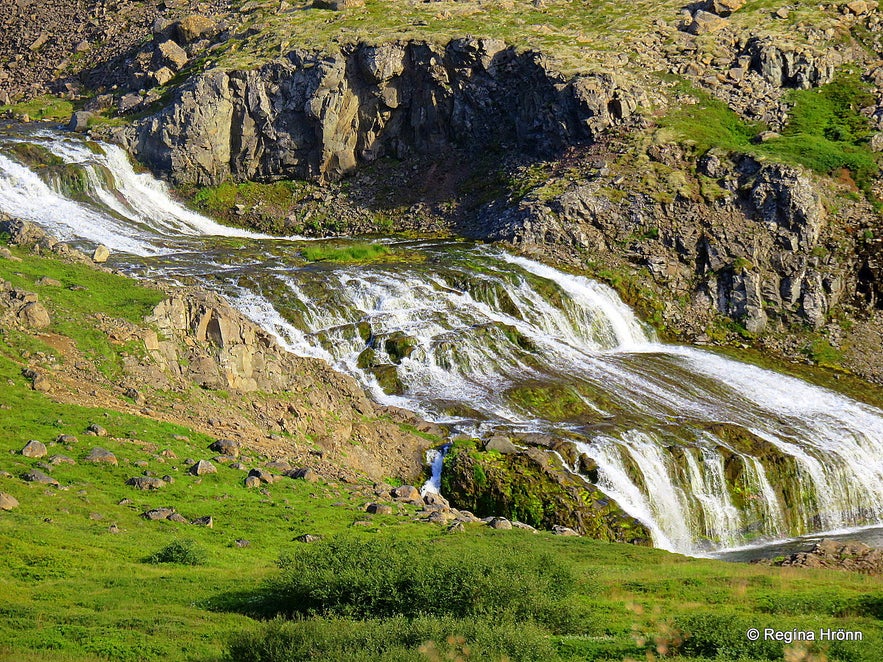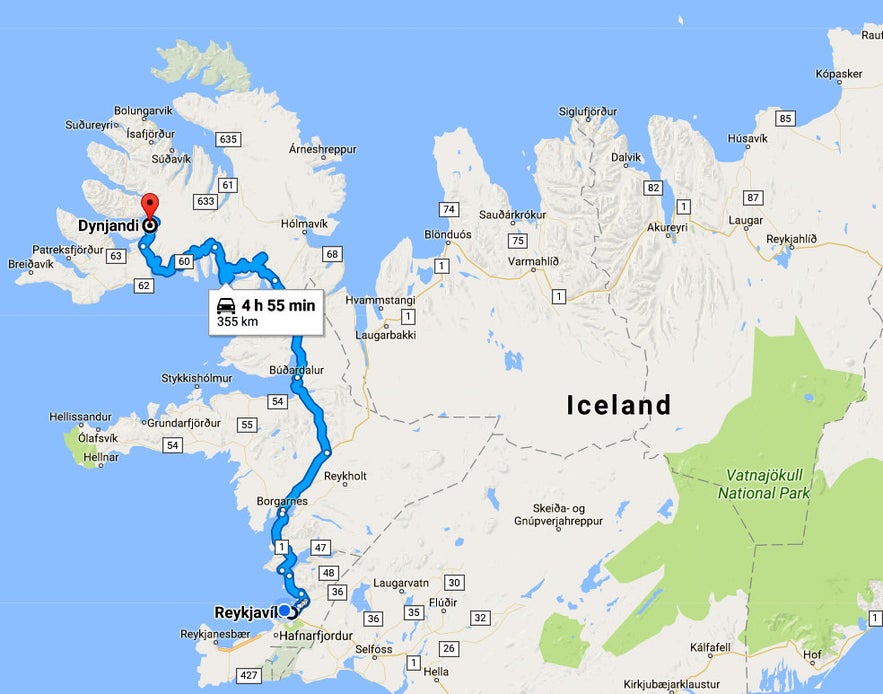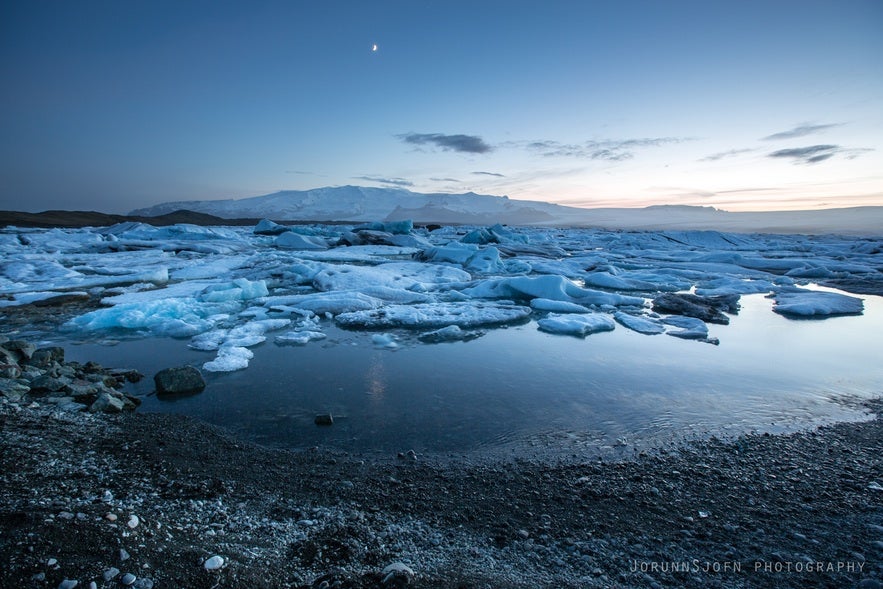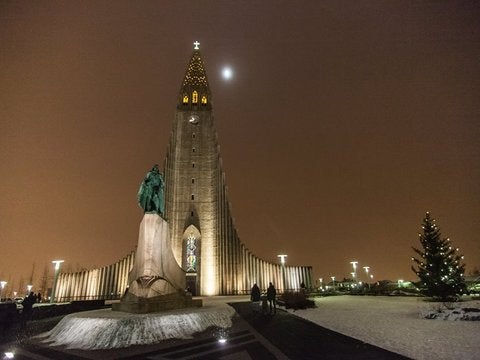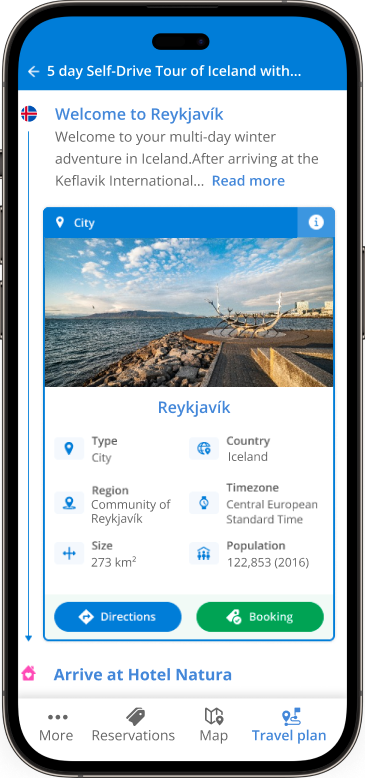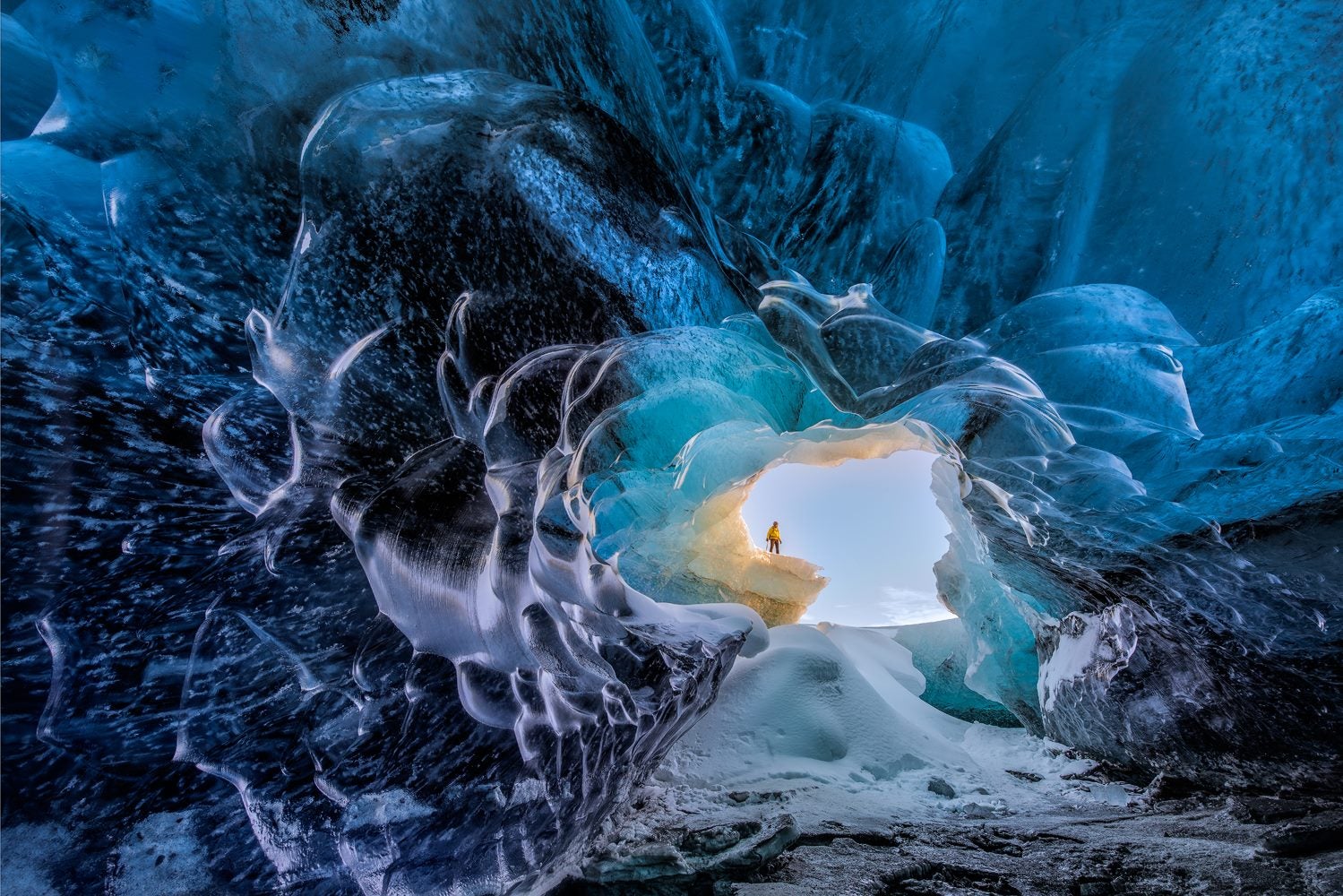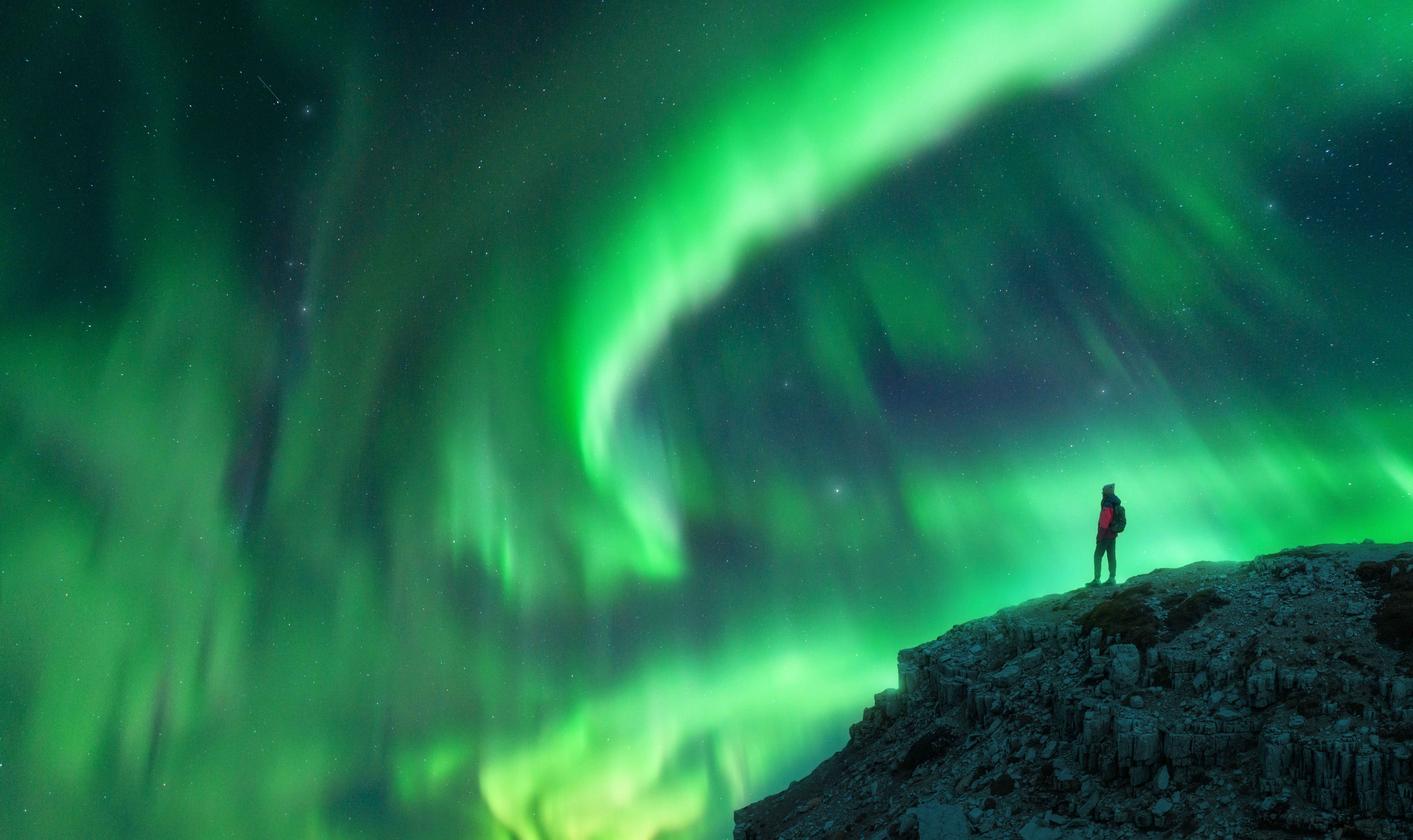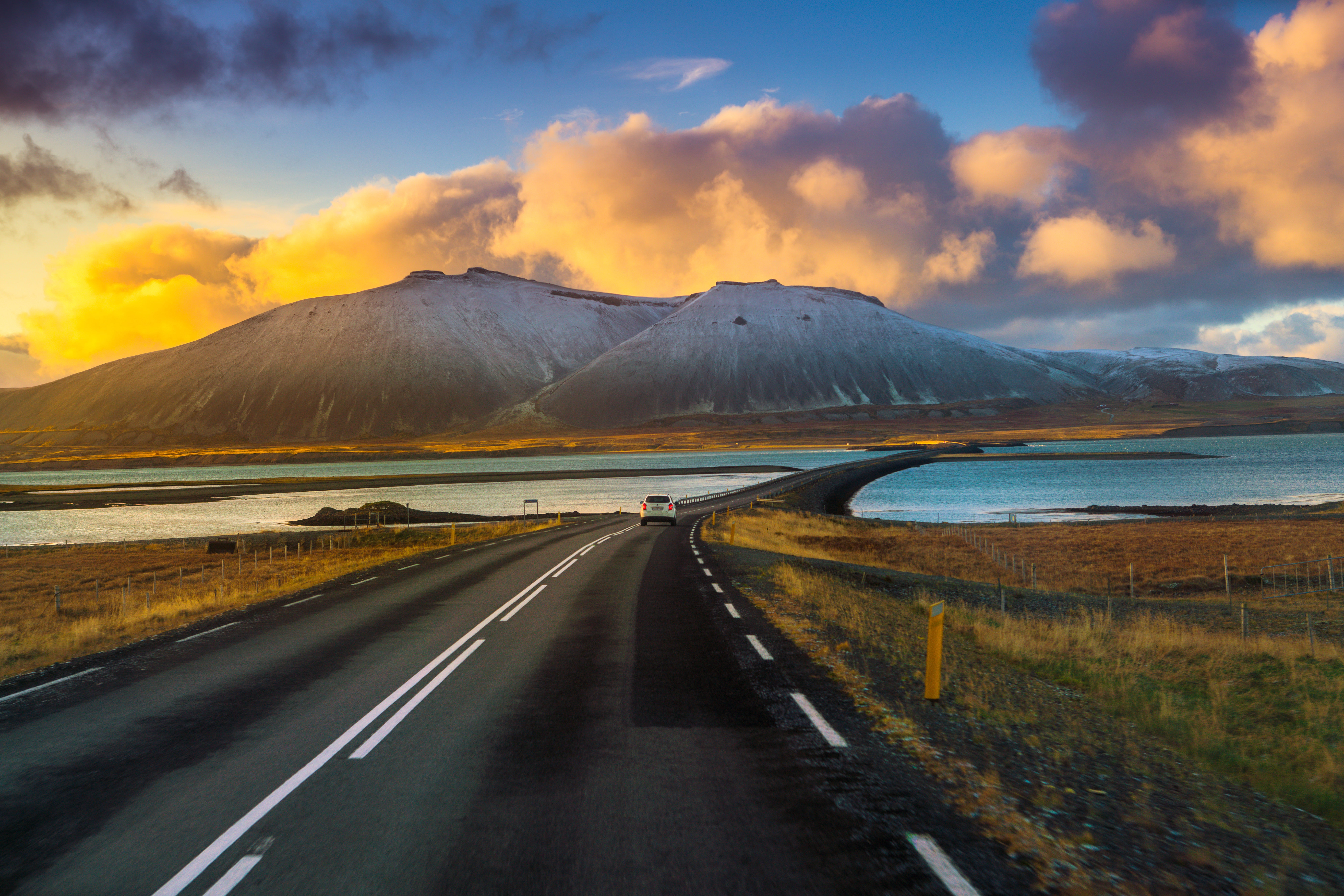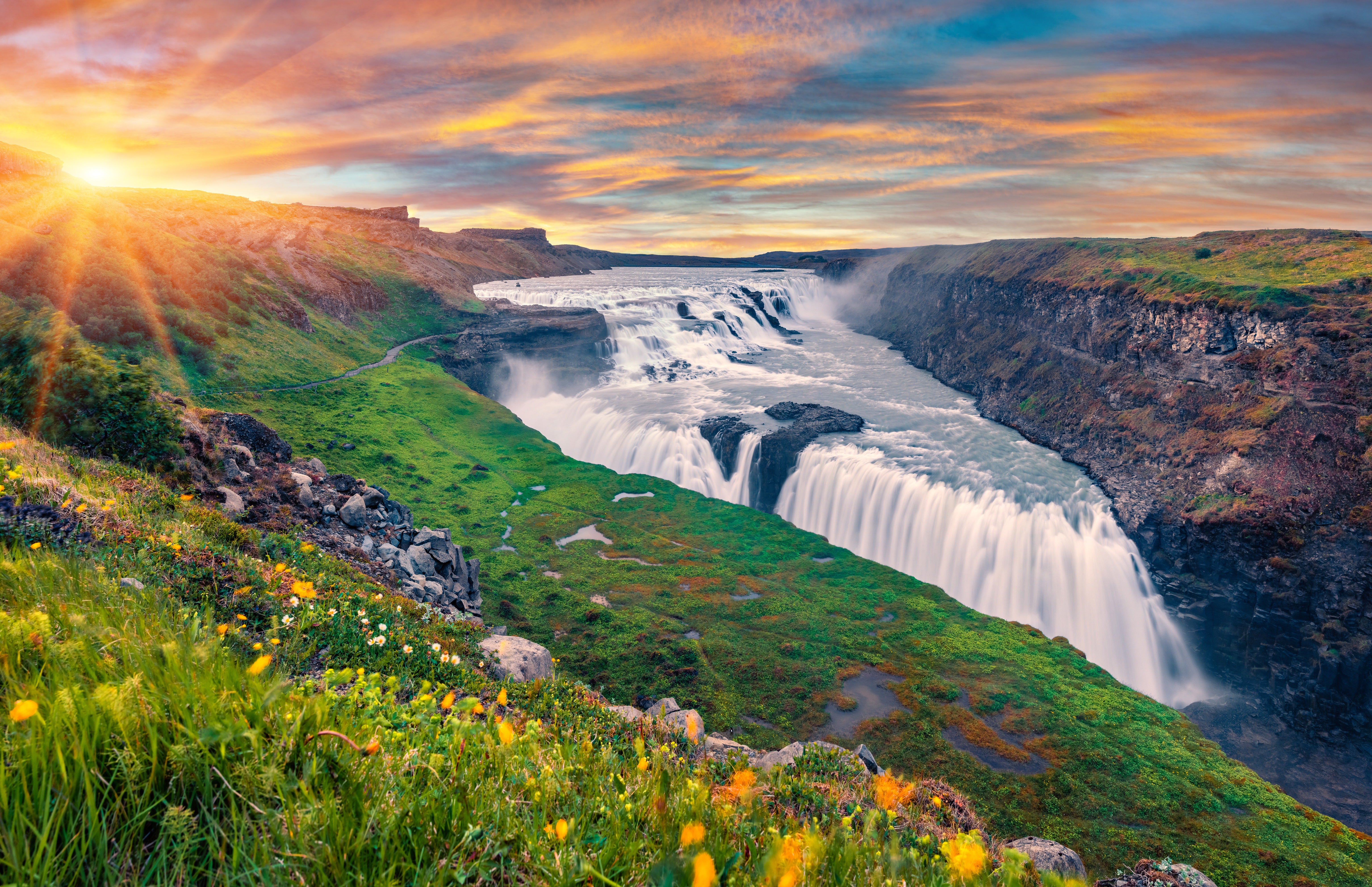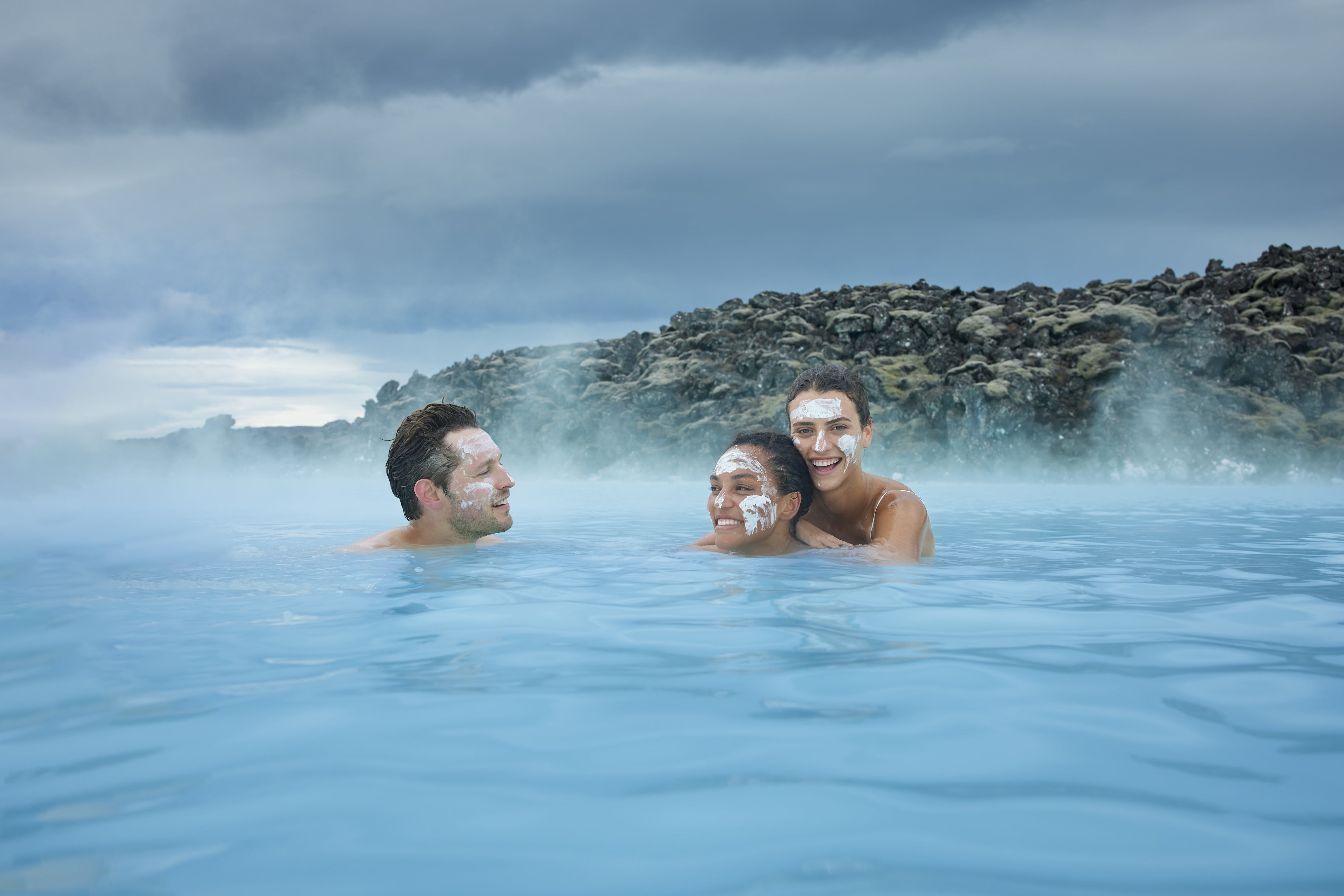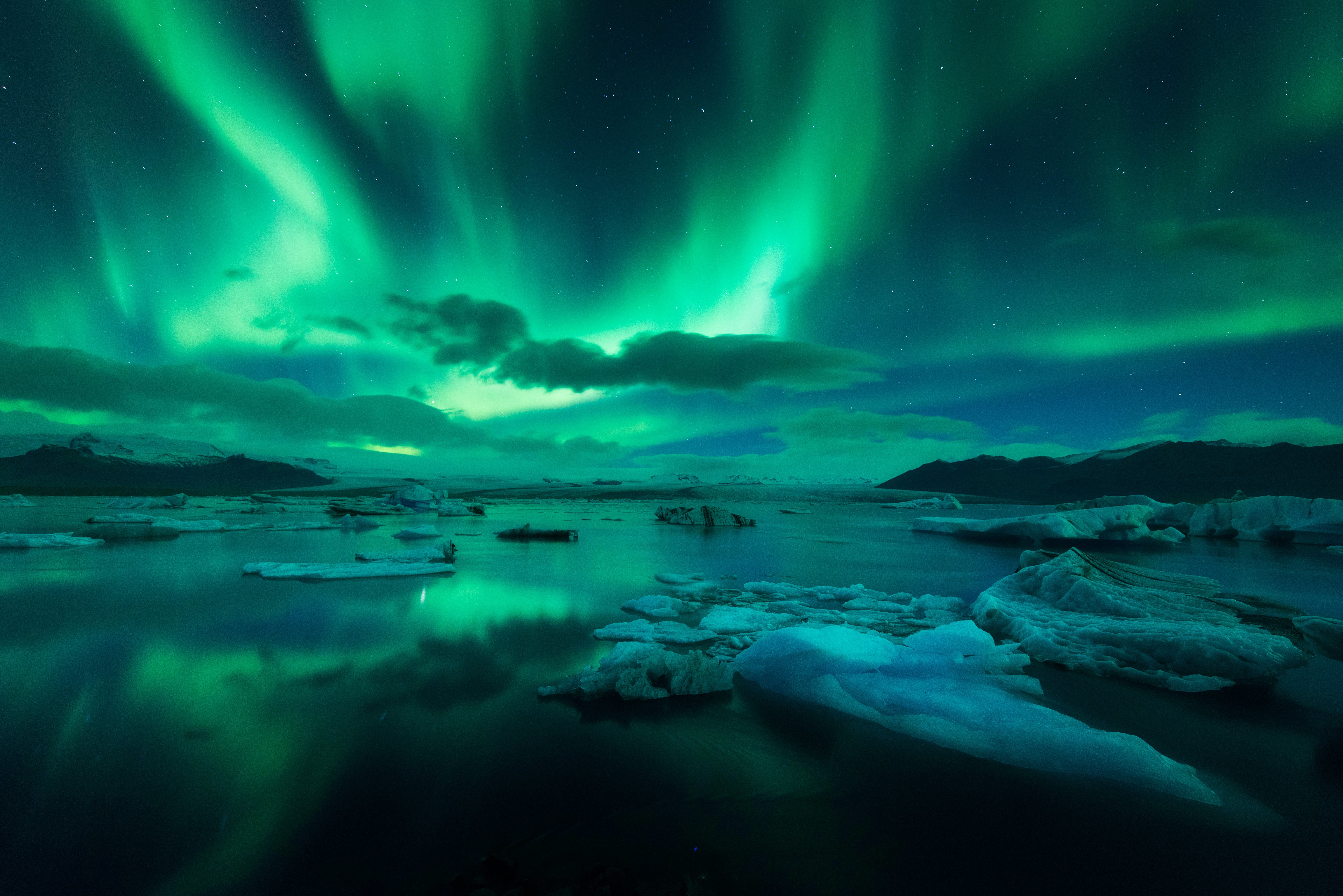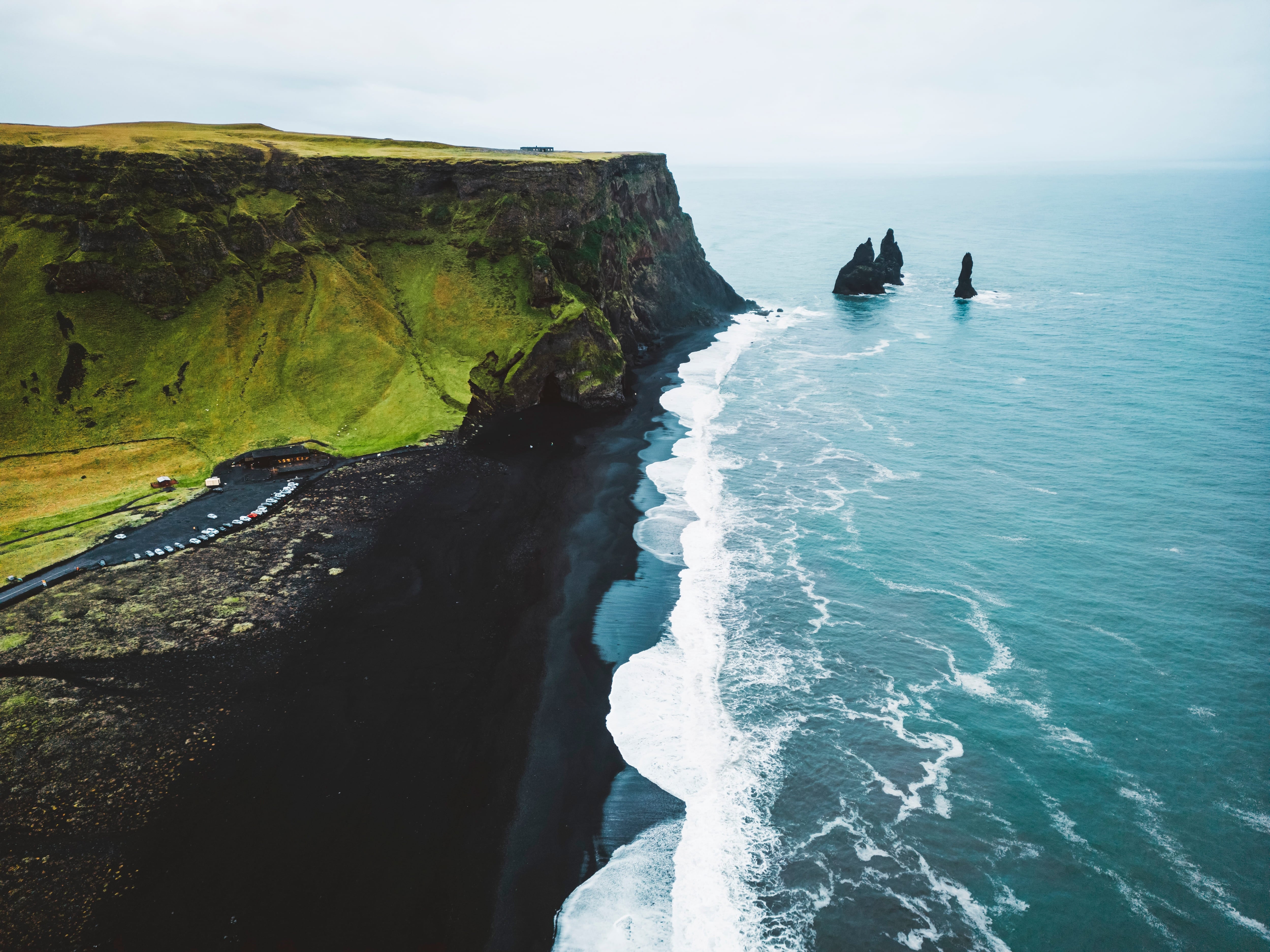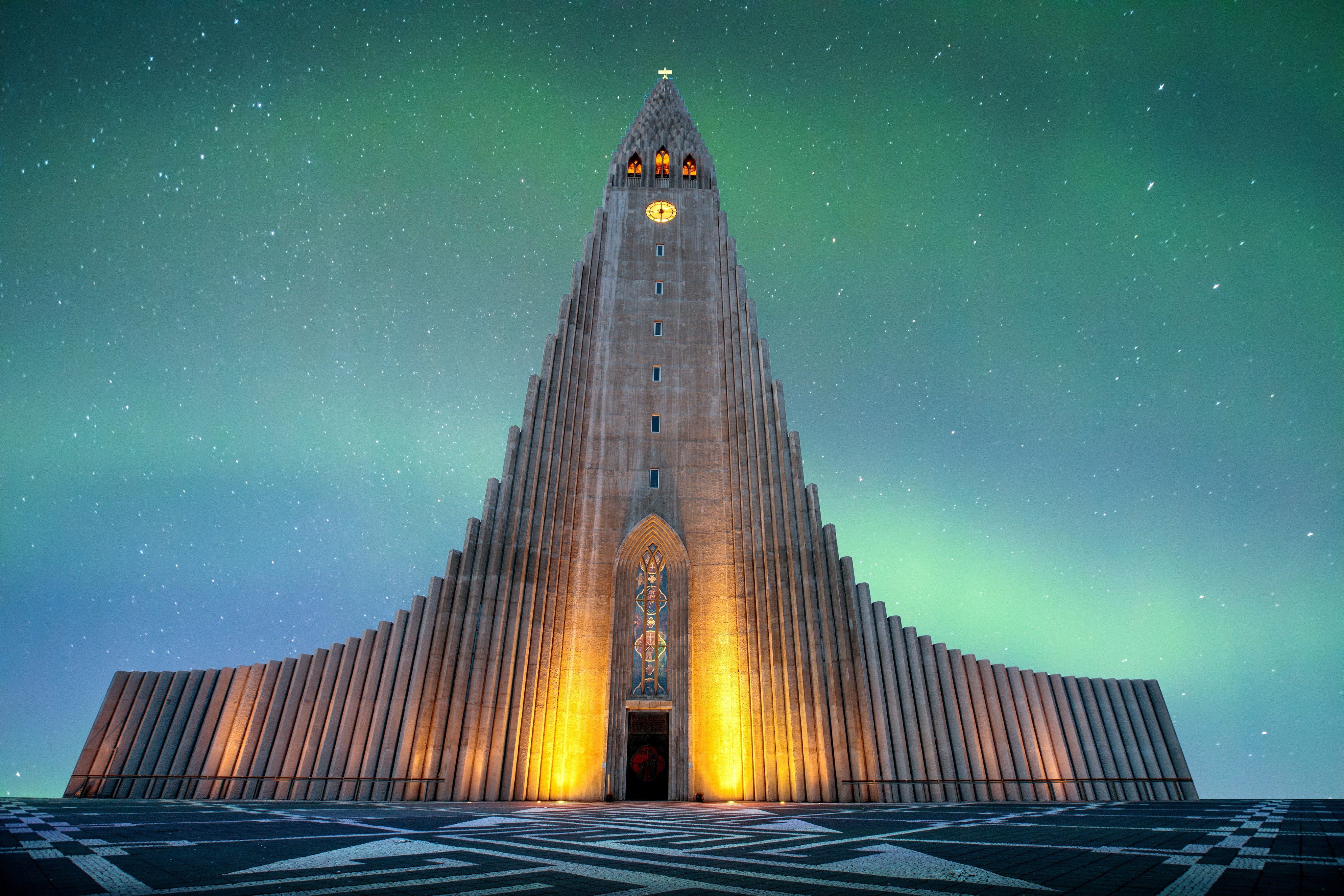Deep in the remote Westfjords of Iceland, you will find the breathtakingly beautiful Dynjandi waterfall. In this travel-blog I want to show you my visits to my second favourite waterfall in Iceland.
Dynjandi waterfall is the biggest waterfall in the Westfjords and truly deserves to be called the Jewel of the Westfjords.
It is, in my opinion, one of the most beautiful waterfalls in Iceland, at least the most majestic waterfall I have seen in my country.
Dynjandi waterfall
Dynjandi cascades some 99-100 meters, looking exactly like a beautiful bridal veil.
On top, it is 30 meters wide and widens up to 60 meters at the bottom.
There are 6 other waterfalls below Dynjandi, which one passes on the way up to the biggest waterfall. It is quite a scenic route with an elevation of some 200 meters up to the biggest waterfall.
Dynjandi waterfall
The names of the other waterfalls are from above according to the map by the parking lot:
Hæstahjallafoss
Strompgljúfrafoss (Strompur)
Göngumannafoss
Hrísvaðsfoss
Kvíslarfoss
Hundafoss
Bæjarfoss (Sjóarfoss)
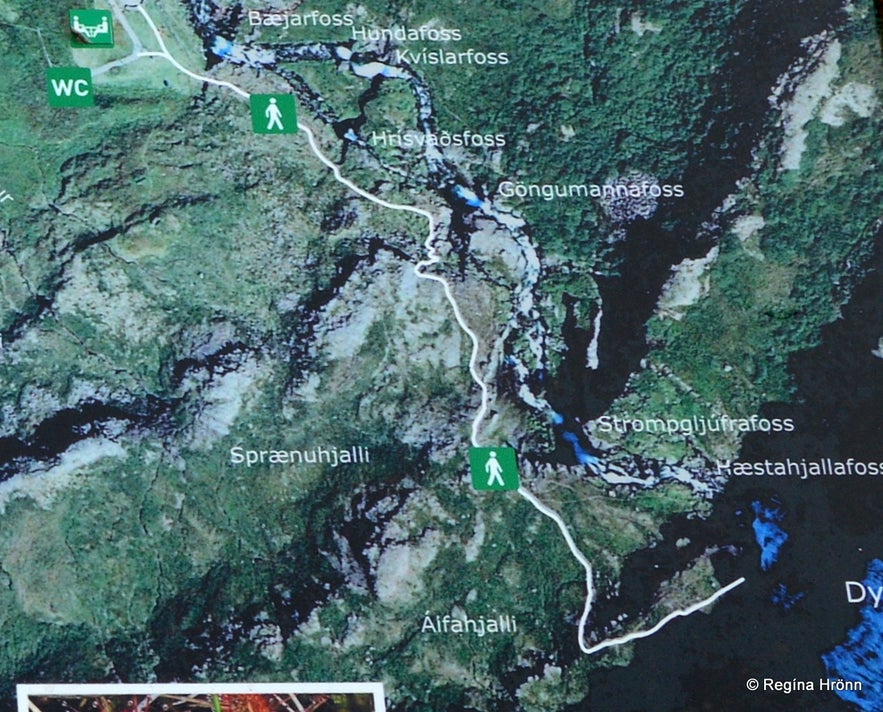
The map by Dynjandi parking lot
You can see that all these waterfalls end in -foss, which is the Icelandic term for a waterfall.
To reach Dynjandi there is a bit of a hike, no more than 15 minutes or so though, and on the way up you can stop by all the smaller waterfalls.
A rocky path, made by volunteers back in 1996, leads up to the waterfalls and it is a bit of a climb to reach the biggest waterfall, Dynjandi.
In the fall of 2024, additional paths were being made to make the ascent easier.
Hrísvaðsfoss waterfall
The climb is nothing major though, but if you have bad knees for example, then it can be taxing. Once when I visited Dynjandi a man with bad knees had to stop when he was halfway up and turn back.
He didn't start on this hike in vain though as there are so many lovely waterfalls on the way, all of them marked and new observation platforms have been put up by many of them, where one can sit and rest and enjoy this wonderful scenery.
The Icelandic term dynjandi means thunderous or resounding and you will understand why when you hear the thunderous sounds of it in my videos.
There are many beautiful angles of Dynjandi and it is best to take photos of it with people in them so that you can see how huge this beautiful waterfall is.
Standing next to it will take your breath away.
It is said that a supernatural being lives in every waterfall.
I can agree with this and have sometimes sensed these supernatural beings.
at least there is amazing energy by the waterfall and I had a hard time tearing myself away from it.
Here below is a video that my husband shot at Dynjandi.
Dynjandi is preserved as a natural protected monument (since 1981). We are asked to stay on the paths to preserve nature and prevent this beautiful place from being downtrodden.
It was possible with great caution to walk behind the Göngumannafoss waterfall.
I have walked up to it and taken some photos, but never walked behind it, as from what I have seen there is very little space behind it.
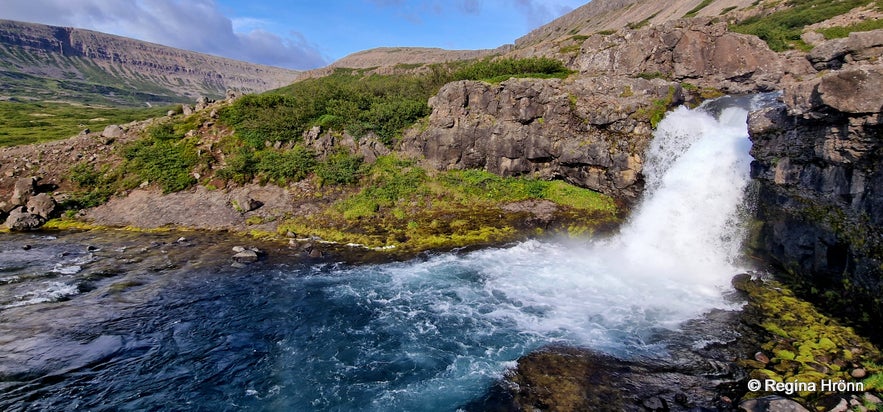 Göngumannafoss
Göngumannafoss
It is not possible to walk up to these waterfalls anymore as with increased traffic we have to stay on the paths.
Below you will see Dynjandi and Strompgljúfrafoss waterfalls, which make a beautiful pair. Notice the tiny people in front of Dynjandi.
Dynjandi and Strompgljúfrafoss waterfall - this is one of my favourite photos
Dynjandi waterfall is located by Dynjandisvogur bay and Arnarfjörður fjord. Arnarfjörður fjord is 30 km long and 5-10 km wide and the second biggest fjord in the Westfjords (only the Ísafjarðardjúp on the northern part is bigger).
Many bird species stay in this fjord in the summertime, and all in all 35 species have been registered in Arnarfjörður fjord.
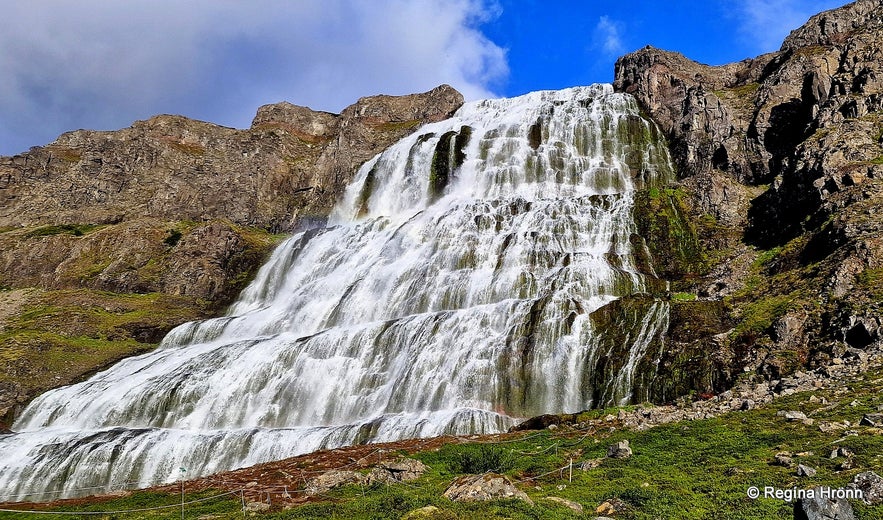 Dynjandi on a sunny day
Dynjandi on a sunny day
Arnarfjörður is known for being Iceland's most notorious sea monster fjord!
In Bíldudalur village close by you can learn all about these sea monsters at the Sea Monster Museum.
I have written another travel-blog just about Arnarfjörður fjord and what to see and do in this long fjord.
Bright red layers of iron-rich soil by Dynjandi waterfall
Can you guess what you are seeing in my photos? You will see these vivid colours when you stand right next to Dynjandi, and I could see a glimpse of the same bright red colour in one spot in Dynjandi waterfall itself.
I have never seen such vivid red colours in nature before, ever so pretty. The red colour stems from ancient layers of soil (rauðalög) rich in iron, stuck between lava beds.
I also saw such red iron rocks close to Drangajökull glacier, Iceland's northernmost glacier: a Beautiful Hike to Drangajökull glacier in the Westfjords of Iceland.
Layers of soil rich in iron behind Dynjandi waterfall
I had wanted to see Dynjandi ever since I was a little girl, but then the roads were in a lot worse condition than they are today, so my family always skipped going to the Westfjords, even though my maternal grandmother was born and raised there.
My 200th Travel Blog - Ingjaldssandur in the Westfjords - my Grandmother's Birthplace
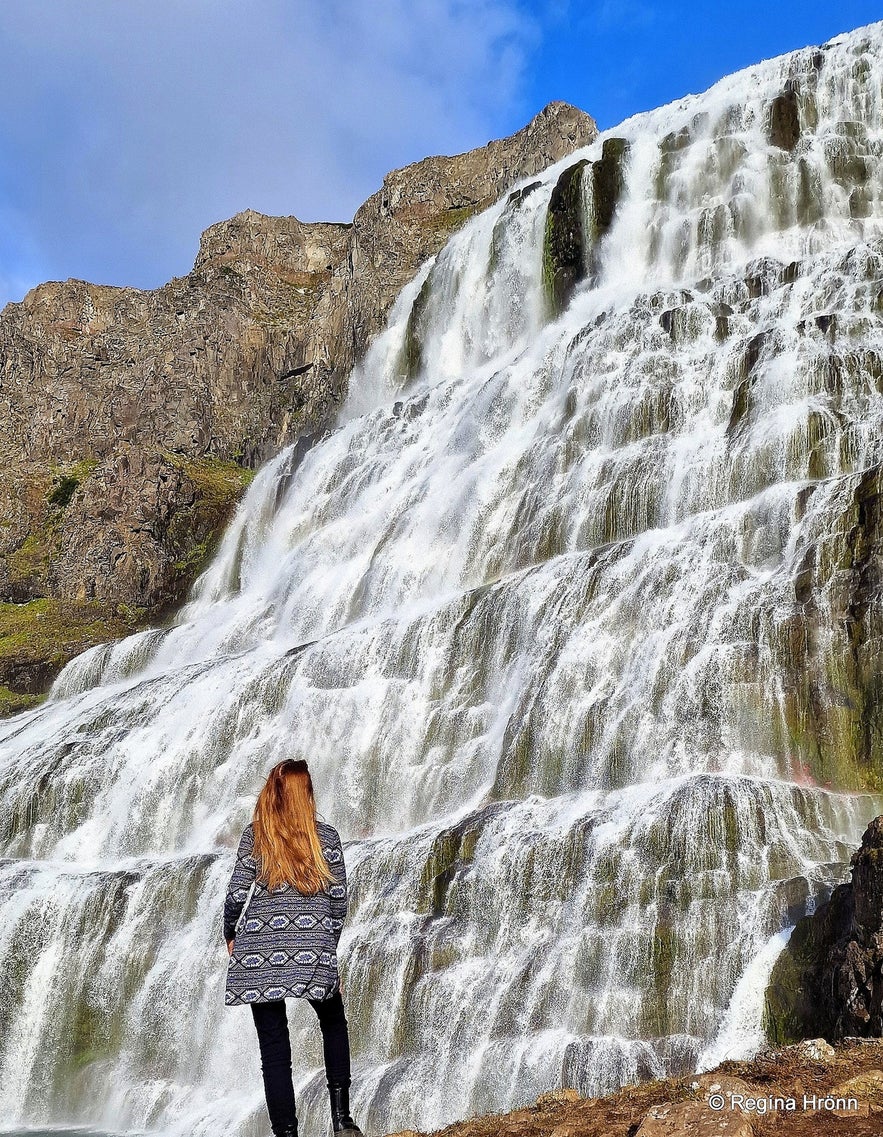 By Dynjandi in 2024
By Dynjandi in 2024
So I waited for years to be able to see this beautiful waterfall and when I was finally able to visit Dynjandi it was all I had ever expected - it was so worth such a long wait - it is for sure the Jewel of the Westfjords.
And no matter how often I visit Dynjandi I always get blown away by its majestic beauty and have a hard time tearing myself away from it. I am completely mesmerized.
We were in luck in the summer of 2024, when the weather had been bad for the whole summer, that the Dynjandi waterfall was all lit up by the sun when we reached it. The sunshine makes it even more majestic.
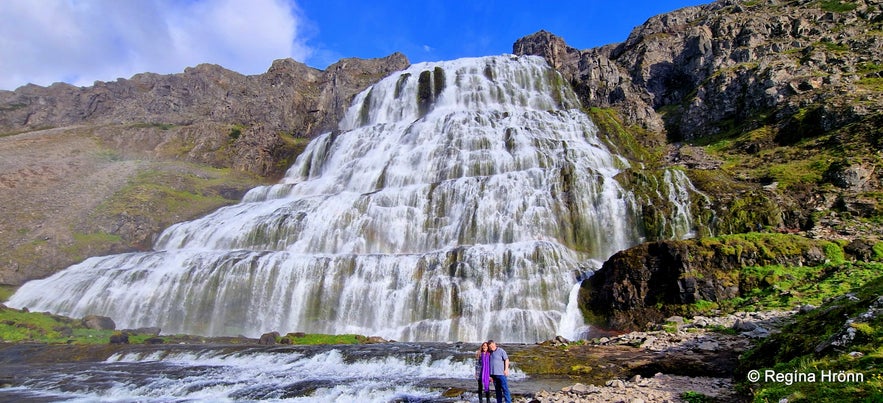 Dynjandi waterfall all lit up by the sun
Dynjandi waterfall all lit up by the sun
I first visited Dynjandi when my husband took me there back in 2013 on the very day that we started dating.
I was complaining to him that I hadn't seen Dynjandi yet and very much wanted to see this majestic waterfall. He said: "Let's visit it now!" and off we went to the Westfjords and have been together ever since :)
The photo above was taken in the summer of 2024 when we had been married for 10 years.
Archaeological remains by Dynjandi
Ruins of a turf farm
A turf farm by Dynjandi was located by the so-called Bæjarhóll - the Farm Mound and you can visit its remains.
There are 38 different historical remains in this area and the first mention of a farm here is from the Middle Ages.
A path leads to the remains of the farm and outhouses. Above you will see the ruins of one of the outhouses.
The protected Dynjandislaug pool
You will find these remains on your right-hand side as you hike up to Dynjandi. In one spot there is a lukewarm pool, called Volgra or Dynjandislaug pool.
It takes some doing though to find that pool and we are to stay within the paths, but seeing that I am very interested in old remains and hot pools then I searched for the pool as well.
Volgra, which is laden, is protected, and of course, there is no bathing in it.
An information sign by the parking lot
In 1887 the water temperature was measured at 26.5 degrees C and in 1996 the water temperature was down to 23.5 degrees C. It might have been warmer in the olden times and was probably used for washing and bathing. Now it is filled with vegetation.
What a beautiful spot for a farm, although I remember hearing that the farmer's wife couldn't stand constantly listening to the thunderous sound of Dynjandi.
The turf farm was inhabited until 1951.
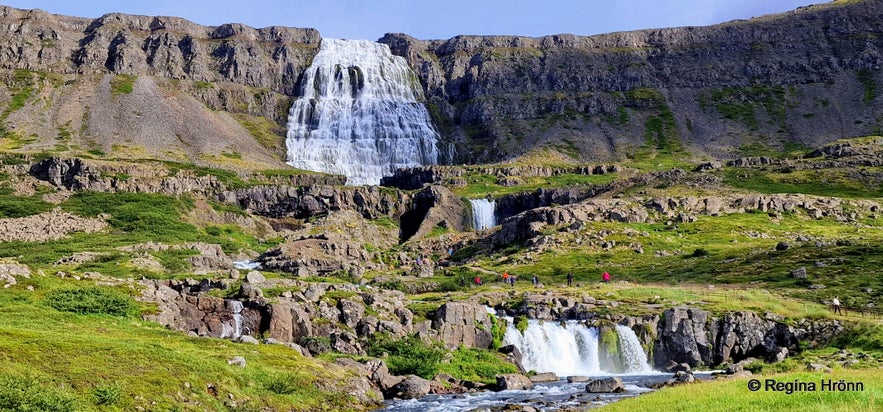 The view of Dynjandi from the bridge. The farm was to the right of the waterfalls
The view of Dynjandi from the bridge. The farm was to the right of the waterfalls
By the parking lot, you will find several information signs and a map pointing to the ruins.
But the waterfalls themselves are such an attraction that I gather that only history buffs like me will go search for the ruins ;)
Dynjandisheiði heath
Dynjandisheiði heath
To reach Dynjandi from the south side one has to drive on Dynjandisheiði heath.
This road was surveyed in 1959 and my father-in-law was one of the Road Administration workers surveying these roads back then in the Westfjords.
 Road construction on the heath in the summer of 2024
Road construction on the heath in the summer of 2024
This gravel road (number 60), which passes over Dynjandisheiði heath, leads from Barðaströnd in the south part of the Westfjords to Dynjandi waterfall. Its highest part is at 500 meters.
The road has been under construction and there were many road construction workers in this area when we drove the Dynjandisheiði heath on several occasions in the fall of 2024.
Dynjandisá river above Dynjandi waterfall
The waterfalls in Dynjandi come from Lake Stóra-Eyjavatn, which is 350 meters above sea level, from which the Dynjandisá river runs.
Dynjandisá river is a direct runoff river and often such rivers have seasonal floods.
The floods in Dynjandisá happen in springtime and in winter, and then the volume of the river can increase up to tenfold!
Just imagine what the Dynjandi waterfall looks like during these seasonal floods!
Dynjandisá river above Dynjandi waterfall
When driving north on the russet gravel road on Dynjandisheiði heath we are driving on top of the waterfall, so to speak.
There are some pretty waterfalls above Dynjandi and the view from there of Arnarfjörður fjord and Dynjandisvogur bay is breathtaking. You can stop here and have a look at the waterfalls and enjoy the view.
In my photo below you can see one of the waterfalls in Dynjandisá river above Dynjandi waterfall.
Dynjandisá river above Dynjandi waterfall, this might be Kálfeyrarfoss waterfall
To reach Dynjandi from the north side of the Westfjords you had to cross Hrafnseyrarheiði heath.
So you can see that this magnificent waterfall was not easily reached before the tunnel was opened, kind of tucked away between 2 heaths, which closes due to heavy snow in the wintertime.
Dynjandisheiði heath was opened for traffic on the 29th of March in 2017, but in 2015 it opened as late as May, after being closed for 5 months!
Hrafnseyrarheiði heath ascending from Arnarfjörður fjord
In my photo above you will see the steep, winding gravel road on Hrafnseyrarheiði heath, looking back in the direction of Arnarfjörður fjord.
Just imagine what it must look like in the wintertime all covered in the deep snow!
It was, of course, difficult for the inhabitants of the Westfjords when the main road between north and south closed for such a long time.
 Hrafnseyrarheiði heath descending into Dýrafjörður fjord
Hrafnseyrarheiði heath descending into Dýrafjörður fjord
A new tunnel, Dýrafjarðargöng, opened in the year 2020 from Arnarfjörður to the next fjord Dýrafjörður and Þingeyri village.
That tunnel is 5.6 km long and shortens Vestfjarðavegur road by 27.4 km.
So now it is much easier to drive between these two fjords and we drove through the tunnel several times during our many visits in 2024.
 Driving on the gravel road high up on Hrafnseyrarheiði heath
Driving on the gravel road high up on Hrafnseyrarheiði heath
But we also like driving the heath, I find it exciting and a bit scary driving this high up and the view is amazing in the summertime.
Before the tunnel opened it was especially difficult for the companies, that operate both on the north and the south parts of the Westfjords.
One fish processing had to drive around the Westfjords for 520 km (one way!) instead of the 115 km over the heaths to reach its destination on the other side of the Westfjords!
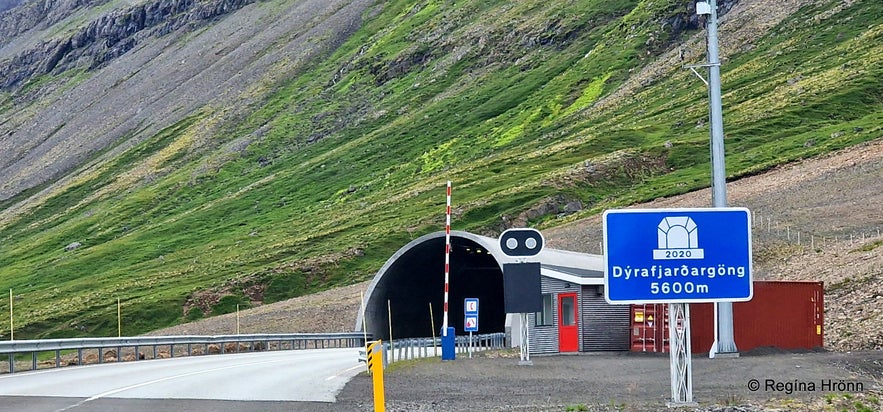 Dýrafjarðargöng tunnel - 5.600 m long
Dýrafjarðargöng tunnel - 5.600 m long
Other tunnels have made the Westfjords much easier to visit, like the Vestfjarðagöng tunnels, which were opened back in 1996.
They connect Skutulsfjörður, Súgandisfjörður, and Önundarfjörður fjords and are altogether 9.113 m long (Bændablaðið).
Then we have the Bolungarvíkurgöng tunnel which opened back in 2010. And more tunnels are needed in the Westfjords.
Gyrðisfoss waterfall
When you descend from Dynjandisheiði heath (or ascend for that matter if you come from the northern part of the Westfjords) you will see another lovely waterfall Gyrðisfoss waterfall in Svíná river.
To reach the Westfjords you rent a car in Reykjavík and drive up to the Westfjords in a couple of days. Plan on spending at least 5 days here.
Two summers in a row I spent 9 days in the Westfjords and we held a family reunion here in 2010. And in 2024 we visited the Westfjords twice and explored even more.
There are many guided tours to Dynjandi waterfall and a combined tour by Westfjord Adventures, which I have joined, called the Crown Jewel Jeep Tour | Kjaran's Avenue & Dynjandi, which I highly recommend.
The driver-guide will take you on a ride on the most dangerous road in Iceland!
I have written a travel-blog about that amazing tour: A Tour of Svalvogar & Kjaransbraut in the Westfjords - the most dangerous Road Construction in Iceland.
Here you can see the location of Dynjandi waterfall on the map. Dynjandi is at a distance of some 363 km from Reykjavík.
I have written several other travel-blogs about the Westfjords of Iceland, f.ex.:
The 2 Stone-men in the Westfjords of Iceland - Kleifabúi on Kleifaheiði and the Stone-man by Penna
Patreksfjörður, the friendly Village in the Westfjords
Natural Wonders of the Westfjords of Iceland - Látrabjarg Bird Cliff & Rauðasandur Beach
A Visit to Arnarfjörður in the Westfjords, the Sea Monster Fjord of Iceland
A lovely Stay at Hotel Breiðavík in the Vicinity of Puffins galore at Látrabjarg
Rauðasandur Beach in the Westfjords of Iceland
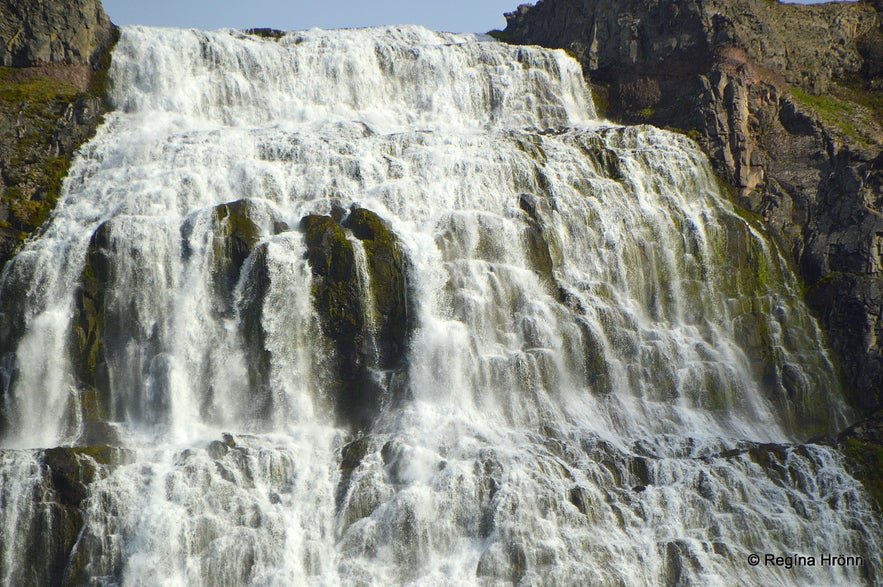 Dynjandi up close
Dynjandi up close
Dynjandi is sometimes called Fjallfoss and I refer to some articles written about this subject (in Icelandic):
Have a lovely time visiting the majestic Dynjandi waterfall and the beautiful Westfjords of Iceland :)

